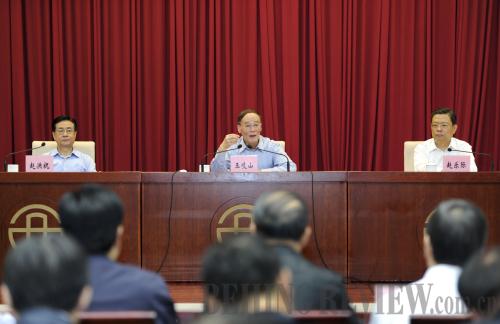|
 |
|
CALL TO ACTION: Wang Qishan (center), Secretary of the CPC Central Commission for Discipline Inspection, addresses a training session on discipline inspection in Beijing on May 17 (XIE HUANCHI) |
China's efforts to root out corruption show no signs of slowing down. Authorities have dispatched 10 inspection teams to five provincial-level regions, a ministry, three state-owned enterprises, and a university, to supervise senior local officials and showcase China's dedication to the fight against corruption, according to a June 3 statement by the office of the leading group for inspection work.
Visits by inspection teams will last around two months. The office publicized inspectors' contact information to seek tip-offs from concerned citizens.
As part of the country's intensified anti-corruption efforts, the routine visits by inspection teams this year will specifically focus on uncovering corruption, according to a meeting to mobilize and train inspectors on May 17.
Liu Changmin, a professor at the China University of Political Science and Law in Beijing, said that gauging officials' integrity was one of the teams' prescribed duties but only part of a broader focus.
"To my knowledge, the fight against corruption has never been emphasized so much in the work of the Party's previous inspection teams," she said.
Addressing the May 17 meeting, China's top anti-graft official Wang Qishan said that inspectors should investigate practices such as trading power for money, abusing power for personal interest, bribery and work styles including formalism, bureaucracy, hedonism and extravagance.
They should also look for breaches of Party political disciplines and corruption related to officials' selection and promotion, said Wang, who is secretary of the Central Commission for Discipline Inspection (CCDI) of the Communist Party of China (CPC).
"Undoubtedly, by setting the corruption fight as a top priority for inspection teams this year, the Party wants to win more public support and increase the credibility of local authorities," said Li Chengyan, Director of the Research Center for Clean Government Construction at Peking University.
A decade of evolution
The central inspection system of China originated from 1996, when the CCDI was determined to send ministerial-level officials to inspect local administrations. The system was confirmed by the 16th CPC National Congress in 2002.
In 2003, the CPC established five teams to oversee performance of senior local officials. The move marked the official establishment of the system. Now there are 12 teams and inspections are formally mandated by the CPC Constitution. In 2010, even military organs became subject to such oversight.
Under the system, inspection bodies at various levels are required to supervise officials at lower levels. The State-owned Assets Supervision and Administration Commission of the State Council inspects and supervises state-owned enterprises.
This year, five of the Party's 12 inspection teams have been dispatched to Inner Mongolia Autonomous Region, Chongqing Municipality, and Jiangxi, Guizhou, and Hubei provinces. Another five teams have targeted the Ministry of Water Resources, the Export-Import Bank of China, the China Grain Reserves Corp., the China Publishing Group and Renmin University of China.
The inspection teams are tasked with conducting an examination of Party organizations at all levels of government, as well as state enterprises, following tips from the public, interviewing officials, and examining documents.
The teams will report to the task force overseeing their operations and offer feedback and suggestions to the agencies they inspect within 15 working days after their report is approved.
The Party organizations that are inspected will be required to file an improvement plan within 60 working days that will be based on the feedback and suggestions they receive, and submit a report on the results within a year after they submit the plan.
Some changes have also been made to inspection teams this year, including a decree that the head of each team will be named before each operation.
| 